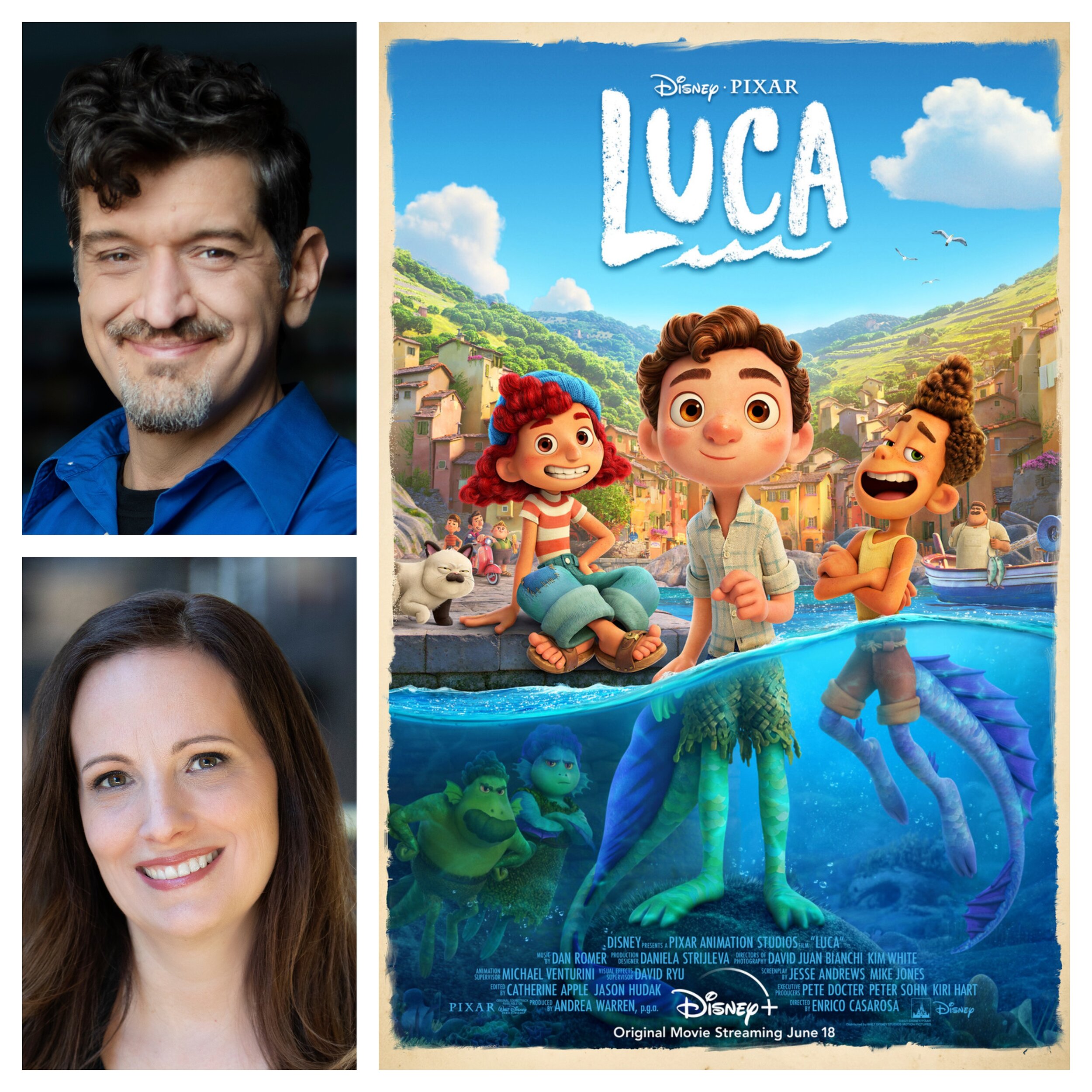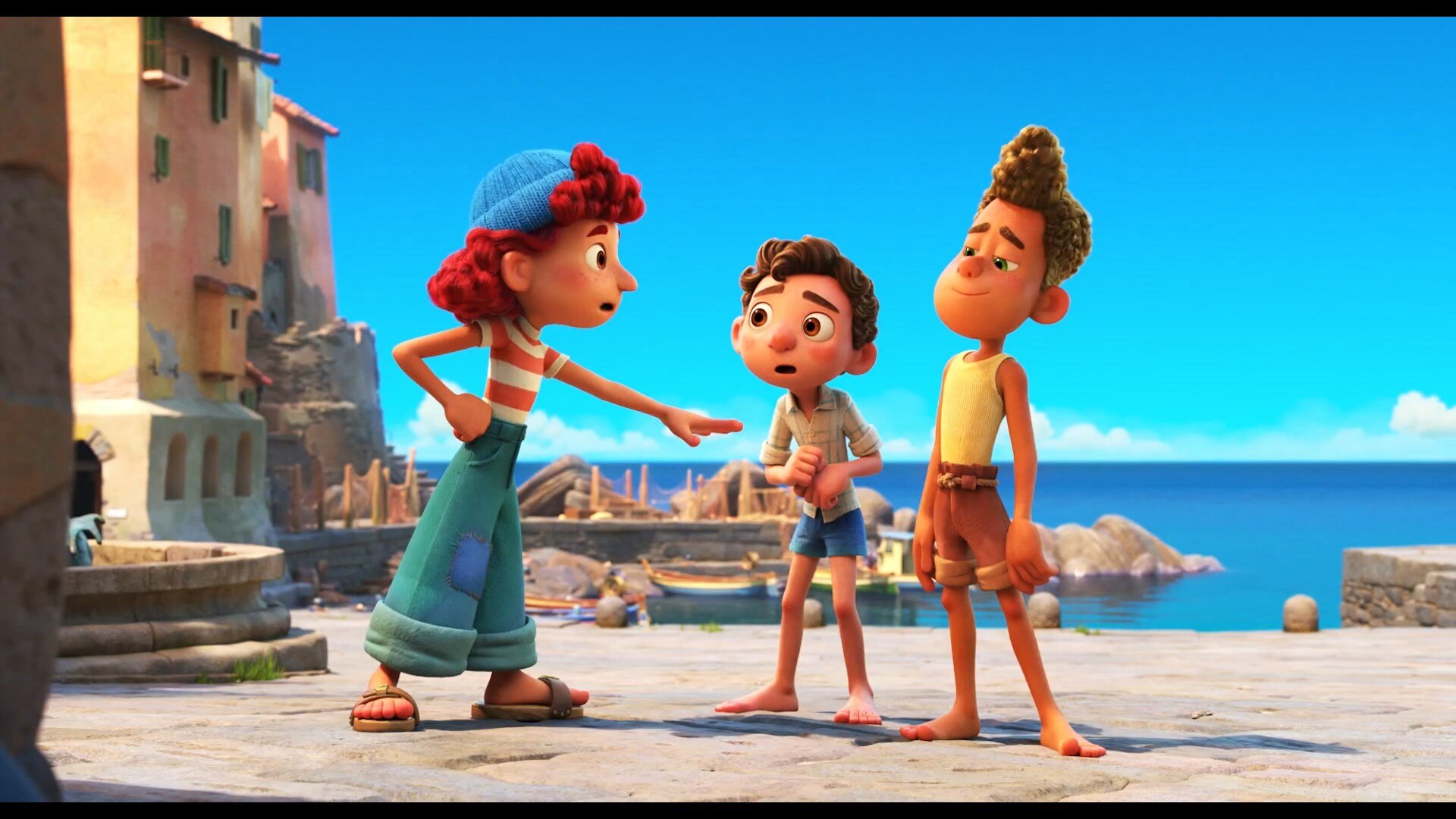Exclusive: Director Enrico Casarosa and Producer Andrea Warren talk Pixar’s Luca
Coming out this summer is Disney and Pixar’s original feature film “Luca,” a fun and heartwarming story about friendship, stepping out of your comfort zone and two teenage sea monsters who experience a life-changing summer.
Set in a beautiful seaside town on the Italian Riviera, “Luca” is a story about one boy experiencing an unforgettable summer filled with gelato, pasta and endless scooter rides. Luca shares these adventures with his newfound best friend, Alberto, but all the fun is threatened by a deeply-held secret: they are both sea monsters from another world just below the water’s surface.
The voice cast features Jacob Tremblay as Luca Paguro, Jack Dylan Grazer as Alberto Scorfano, Emma Berman as Giulia Marcovaldo, Saverio Raimondo as town bully Ercole Visconti, Maya Rudolph as Luca’s mom Daniela, Marco Barricelli as Giulia’s dad Massimo, Jim Gaffigan as Luca’s dad Lorenzo, and Sandy Martin as Luca’s grandma.
From Pixar Animation Studios, “Luca” is directed by Academy Award nominee Enrico Casarosa (“La Luna”) and produced by Andrea Warren (“Lava,” “Cars 3”). Executive producers are Pete Docter, Peter Sohn and Kiri Hart, and associate producer is William Reusch. The story is by Casarosa, Jesse Andrews and Simon Stephenson; Andrews and Mike Jones penned the screenplay. “Luca” opens June 18, 2021.
For Casarosa, who had done the short film La Luna, this is a big project for the Italian native. Having worked on numerous animated films as a storyboard artist before and after La Luna, he’s finally helming a full length feature that reflects his native land and culture. For Warren, she’s been at Disney for years and worked her way up from art department coordinator to computer graphics painter to co-producer and now producer. BlackFilmandTV.com spoke with Casarosa and Warren on their collaboration and their first big project.
For Enrico, you've been doing this for a long time, but now you’re taking the task of making a feature length film. Was ever daunting at some point knowing you have a lot more tools to work with?
Enrico Casarosa: Yes, it was. It's a big, big challenge. You take it on not knowing what's around the corner and knowing there's some storms coming your away. That's the metaphor that comes to mind. You have a great team to go through them. You get knocked down and you get back up and you're doing it again. That's actually part of our process. So as you might have heard by now we put together storyboards in reels, and then we look at it, and then we write it. We do all this hard work. But then we take it apart and see what works and keep what works, and rewrite and rewrite. it’s built in our process to kind of have this big day and say, "what do you think?" and you're like, "it's great, but there's this, this and that.” So there's ups and downs built in, and moments of crisis and things like that but they're wonderful learning opportunities.
I'm very much of the mind of like, this is what changes you and this is what makes you grow. The more the challenge, the sweeter it is when you get to this point where we're very close to three weeks from almost been done. You come together as a team. There's so many pluses, and it really, you wouldn't want it any other way in the end, because it really makes you grow so much. There's not a whole lot of things without difficulty that are really going to have this sense of satisfaction at the end of it.
For you, Andrea, as I look at your background, you've moved up the chain. When it comes to animation, you have worked in different roles, and this is a big production because you’re one of the main producers. How does it feel for you? How did your level responsibilities differ?
Andrea Warren: Yeah. I started as a production assistant at Pixar many years ago. I did every every job along the way and it was fun. I really loved every single one. I learned along the way. I did feel prepared for this. I didn't know a pandemic was coming. Who can prepare for that, but I really enjoyed being partnered to Enrico in terms of leading the team and I felt this film was so special. I really wanted to help carve out the space for the exploration that was needed to find the look and find this really special story; but still might have to keep things moving as producers. It was all about finding that balance. And certainly as we transition to working from home, it really became about trying to bridge the gap that existed and how much harder it was to communicate with everybody and make sure that teams and everybody felt supported and connected, when that was extra difficult.
What was more important for you? The animation, the storytelling or the homage to Italy and all of its offerings?
Enrico Casarosa: Yeah, that's a very good question. The hardest job is finding really the balance over your themes, which is in the story. That is still the most important job. What is the core? The most important thing here is this friendship and what are we saying about friendship, and everything around it? And to be a little bit in support of it, or another wonderful theme, but just a little bit, not as much screentime for example, because you're really choosing your battles and what you put forth. We have to balance not only the relationship but what it was all about Luca because Luca is our protagonist and his changes really even within the friendship is even even more so the focus. So that was really the key balance defined and what is the right tension to bring to the story?
This is a runaway story and they're running away. You haven't seen a whole lot of that, but the parents need will need to be chasing and so that why would you bring fun attention to this? Jim Gaffigan, Maya Rudolph were so much fun in this movie. That balance is really still the wonderful part of it. Once you get into making it, what's great is then you open up to elevating everything. Everything you have and where animators bring life to this character, which is, as a director is one of the most satisfying wonderful moments. When your storyboards or your ideas are going to truly come to light, these virtual puppets are going to really feel alive. That's so exciting. The animators elevated and we were very open to like, "Is there a better way to do this? Is there a funnier way to do this?" So that was really collaborative again, and really exciting. Those are the things that came to my mind with your question.
How important important was it for the crew to go to the actual places to construct some of the images that we're going to see on screen?
Andrea Warren: I think it's really important. You can get a lot from books and reference, obviously, but I think our mission is to make the audience feel like they are there, that they're in that place. I think nothing can quite replace, being there, hearing the sounds, feeling the sun, seeing all the details and I think that it’s really their job is to take in the whole of it, and then boil it down to what details matter and what makes a difference. We can't capture everything, and we don't want to capture everything.
They'll be too visually distracting, too busy. This job to design, according to the details that really sell the place, that really make you feel like you're there. I always laugh because I think when a Pixar team goes somewhere they look like the most odd tourists that you've ever seen in your life. I'm sure that people are wondering, someone is zooming in and taking a picture of stucco, another person is taking a picture of the street we love. We love trying to find the right details but that come together to make the finished design.









